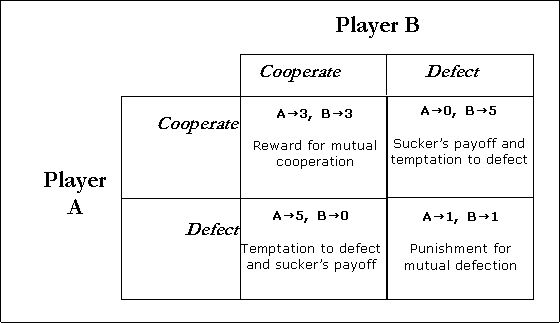... leniency policy is free from the process out, while his accomplices to the full extent of the law hits (10 years imprisonment).
they both Admit that the perpetrator, you will get 8 years in prison because of mitigating circumstances.
Admits none, are both only because of illegal possession of arms to one year in prison.
The payouts, so the "result" of the game for each player or prisoners, are in negative Gefängnisjahren measured.
it can be seen that the players very well, if both the act of denying it. Because of the leniency notice, however, have both an incentive, the act of confess. the
A confession is even independent from the receive of the other for each of the two prisoners to be beneficial. This leads to the overall worst result (16 years imprisonment).
Optimal behavior = Tit for Tat
political scientist and mathematician Robert Axelrod has iterierte computer simulations to this prisoner's dilemma develops. In such iterated Play, eliminates the Moment of the lack of knowledge about the behavior of the other. In the simulations shows that the easiest and most successful of all programs "Tit for Tat" was.
This looks like the first player focuses on cooperation and then each does what the other players at the train already has done: to Cooperate or defektieren (= not cooperate).
Axelrod proposes four Imperatives as pointing the way for an optimal decision-making behavior:
1. do not Be envious of the success of others!
2. Defektiere not first!
3. Reply to both cooperation as well as Defektion!
4. don't Be too clever!
imperative 1 - don't Be too jealous!
To imperative one to understand, it is a good idea as opposed to Nullsummenspielen to illustrate a point. While chess is a zero-sum game, in which one of the will lose if the other wins, for life does not claim. Both sides can be good or poor performance. People tend to have a Benchmark to create, in this case, the success of the other in comparison to their own success and in order to establish a competitive relationship.
This comparison using an external Ruler leads to envy. The try this envy by the correction of the advantage of the other, to meet, in the prisoner's dilemma only by Defektion achieve. Since Defektion but only to further Defektion leads, does envy is self-defeating.
The strategy Tit for Tat is not successful, that a the other defeated, but by the achievement of a Situation, it both allows you to do well.
Accordingly, you have to be in a Situation that is not as Nullsummenwelt designed is not better than another, to do well: "It doesn't matter if everyone is as good as you or even a little better, as long as you cut off!"
imperative 2 - Defektiere not first!
imperative, two points to the advantage of sustainability. If it is also promising in the short term may appear not to cooperate, in the long run, exactly the opposite is achieved and even the environment is destroyed, the one for our own success is needed.
as Long as the other cooperates, you should also cooperate. But what now, if the other is not cooperating? You should also "turn the other cheek?" This question is answered, imperative three.
imperative 3 - Reply to cooperation and Defektion!
You risk being exploited, if you do not Defektion on Defektion follow, on the other hand, one risks but also an escalation, if you have a Defektion the other hand, with more than a own Defektion answered.
It shows that it is better to be a provocation quick to reply. The longer Defektionen with impunity tolerated will, the more likely it attracts the other party to the conclusion that this could cash out and the harder it is to this pattern leave again.
Provozierbarkeit is dangerous, as retaliation to an endless sequence of mutual Defektion could escalate. Axelrod advises to moderate Provozierbarkeit. The stability of the cooperation will thus be strengthened, if the reaction is somewhat less than the provocation.
imperative 4 - Is not to reflect!
In Nullsummenspielen like chess, it is extremely effective, his opponent strategically to unsettle. Differently it looks with Verteilungsspielen without winners and Losers.
There are it is important, to others it is your Intention by a simple Verhaltensstrategie to be identified. This is your own behavior, however complex, it is for the other inscrutable and leads to messy escalating conditions, which in the end is a sensible cooperation to prevent.
back


